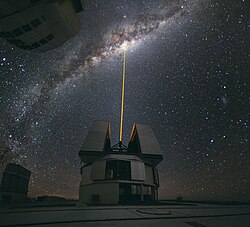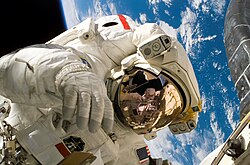Outline of space science

The following outline is provided as an overview of and topical guide to space science:
Space science encompasses all of the scientific disciplines that involve space exploration and study natural phenomena and physical bodies occurring in outer space, such as space medicine and astrobiology.[1][2]
Branches of space sciences[]
Astronomy[]

The diversity found in the different types and scales of astronomical objects make the field of study increasingly specialized.

A proposed timeline of the origin of space, from physical cosmology
See astronomical object for a list of specific types of entities which scientists study. See Earth's location in the universe for an orientation.
- Astronomy
- Outline of astronomy
- Fields of astronomy defined by approach
- Observational astronomy – Observatories on the ground as well as space observatories take measurements of celestial entities and phenomena
- Astrometry – studies the position and movements of celestial objects
- Amateur astronomy
- Theoretical astronomy – mathematical modelling of celestial entities and phenomena
- Fields of astronomy defined by approach
- Fields of astronomy defined by scope
- Astrophysics – study of the physics of the universe; of extraterrestrial objects and interstitial spaces
- Space plasma physics
- Orbital mechanics or astrodynamics, which also has applications to spacecraft
- Stellar astronomy – the study of stars
- Solar astronomy – the study of the Sun
- Planetary science – the study of planets, especially those other than Earth
- Galactic astronomy – the study of the Milky Way galaxy
- Extragalactic astronomy – the study of the larger universe beyond the Milky Way
- Physical cosmology – the study of the Universe as a whole
- Astrophysics – study of the physics of the universe; of extraterrestrial objects and interstitial spaces
- Outline of astronomy
Astronautics[]

Astronaut Piers Sellers during the third spacewalk of STS-121, a demonstration of orbiter heat shield repair techniques
Astronautics – science and engineering of spacefaring and spaceflight, a subset of Aerospace engineering (which includes atmospheric flight)
- Outline of aerospace
- Aerospace engineering
- Life in space
- Living organisms in space
- Humans in space
- Animals in space
- Cat in space
- Dogs in space
- Mice in space
- Monkeys and apes in space
- Tortoises in space
- Microorganisms tested in outer space
- Plants in space
- Space habitation
- Effect of spaceflight on the human body
- Food in space
- Medicine in space
- Religion in space
- Sex in space
- Writing in space
- Living organisms in space
[]
- Astrobiology
- Astrobotany
- Astrochemistry or cosmochemistry
- Cosmology
- Planetary science – overlaps with Earth science
- Micro-g environment research
- Forensic astronomy
- Space archaeology – the study of human artifacts in outer space
- Space medicine
- Space architecture
- Archaeoastronomy – the history of human understanding of the universe
- Astroanthropology
See also[]
- Space Sciences Laboratory – University of California, Berkeley
- Space-based economy
- Commercial use of space
- Space warfare
- Asteroid-impact avoidance
- Space law
- Remote sensing
- Planetarium – A synthetic observatory, used for education and presentations
- Centennial Challenges NASA prize contests
- Space and survival
- Space colonization
- Space industry
- Timeline of artificial satellites and space probes
- Batteries in space
- Control engineering
- Corrosion in space
- Nuclear power in space
- Observatories in space
- Orbital mechanics
- Robotic spacecraft
- Space environment – study of conditions that affect the operation of spacecraft
- Space logistics
- Space technology
References[]
- ^ "Space science – Define Space science", Dictionary.com
- ^ "Space science – Definition of space science", Free Online Dictionary, Thesaurus and Encyclopedia
External links[]
| Wikimedia Commons has media related to Space science. |
- Institute of Space Technology, Pakistan
- Space Sciences @ NASA
- Space Sciences @ ESA
- INDIAN INSTITUTE OF SPACE SCIENCE AND TECHNOLOGY
- Space Sciences Institute
- Space Science & Technology, (Persian) an Iranian nongovernmental group who writes scientific articles about Space Science & Technology
Categories:
- Outlines of sciences
- Wikipedia outlines
- Space lists
- Science-related lists
- Space science